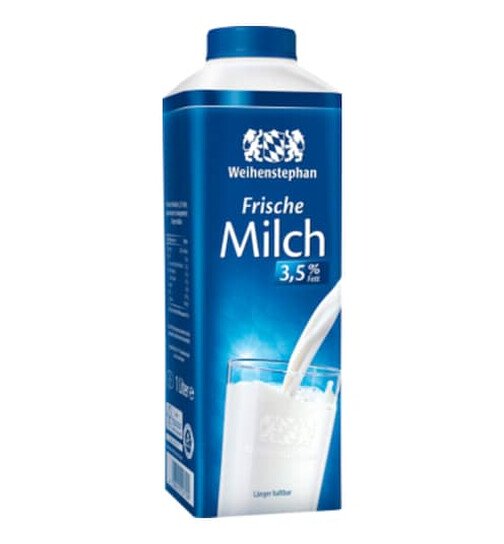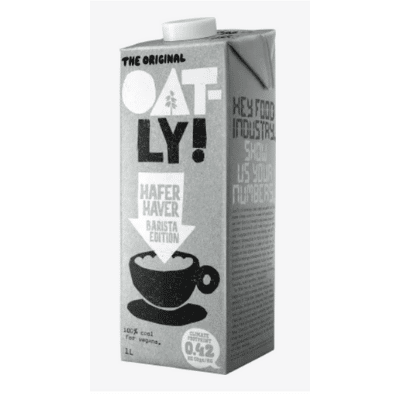Executive Summary
Reducing the costs of your plant-based products is essential for increasing consumer adoption and meeting your sustainability goals. Retailers can take action to achieve price parity via three key steps:
- Fair margins – bring your plant-based margins in line with those of your animal-based products. This will increase consumer adoption and thus drive higher overall revenue. ProVeg recommends a maximum retail margin of 15% for plant-based products. You can phase this in with long-term discount days, like Carrefour Belgium’s 20% discount on ’Veggie Thursdays’. If you want to be a market leader, you can introduce permanent price-parity across your plant-based and animal-based ranges, as Tesco and Co-op have done in the UK.
- Innovate and negotiate – the best way to reduce supply costs in the long term is to continually innovate and invest in R&D, in terms of both food technologies and production equipment. Legacy technologies can’t necessarily achieve the new functional ingredients you might need to produce plant-based alternatives at a cost-efficient scale. It’s also essential to partner with farms to ensure a long-term supply of plant protein. A long-term deal reduces risk for both farmers and suppliers, which reduces costs for you.
- Lobby for subsidy and tax reform – animal-based products are artificially cheap, which prevents consumers from adopting healthier and more sustainable plant-based alternatives. Retailers can advocate for their consumers and combat climate change at the same time by campaigning for reform of the subsidy system. ProVeg is calling for a level playing field between animal-based and plant-based products, worldwide. We urgently need a fair transition for farmers and subsidy/tax systems that protect both consumers and the planet. You can help to spearhead this reform – email [email protected] to find out more.
Why price parity?
In this paper, we outline the top three strategies that retailers can use to increase overall revenues while accelerating the mainstream adoption of plant-based products.
It is essential that we prioritize competitive pricing if we hope to feed the next billion.”
Let’s cut to the chase. Plant-based foods are too pricey for many people to comfortably afford. Many retailers are still pricing plant-based products too highly – with margins of 40-50% typical across Europe.2 This extra cost deters consumers from even trying planet-friendly foods. Over half of Europeans (54%) say that cost is the main barrier to eating more plant-based products.3 If tasty and affordable plant-based meat was widely available at grocery stores, restaurants, butchers, and markets, 38% of Europeans would be very likely or extremely likely to try plant-based meat.4
Yet plant-based products are cheap to produce. “The raw materials of a meat-free product are cheaper to produce than frozen meat – they just are,” explains an expert from European food-producer ABP Eat Well. So what’s going on?
“Retailers don’t want to portray plant-based products as cheap,” says another expert from ABP. And rightly so, agrees food consultant Jack Bobo of Futurity Foods: “I don’t know anybody who wants cheap food. I know people who want quality food at affordable prices.[ …] The language of cheapness undermines your product – it turns it into a commodity […] When it comes to psychology, they should be talking about quality and affordability.”
The experts we’ve spoken to are unanimous in this regard: they’re calling for plant-based foods to be presented as high-quality products (a matter of language) at affordable prices (a matter of margins). We also appreciate that retailers need to stay profitable, so we’ve compiled the best solutions to support your bottom line.
| Typical costs | Plant-based meat | Animal-based meat |
|---|---|---|
| Unit production cost (excl. R&D) | ~1€/kg | ~1€/kg |
| Retail price | 9-14€/kg | 7-9€/kg |
| Revenue | 8-13€/kg | 6-8€/kg |
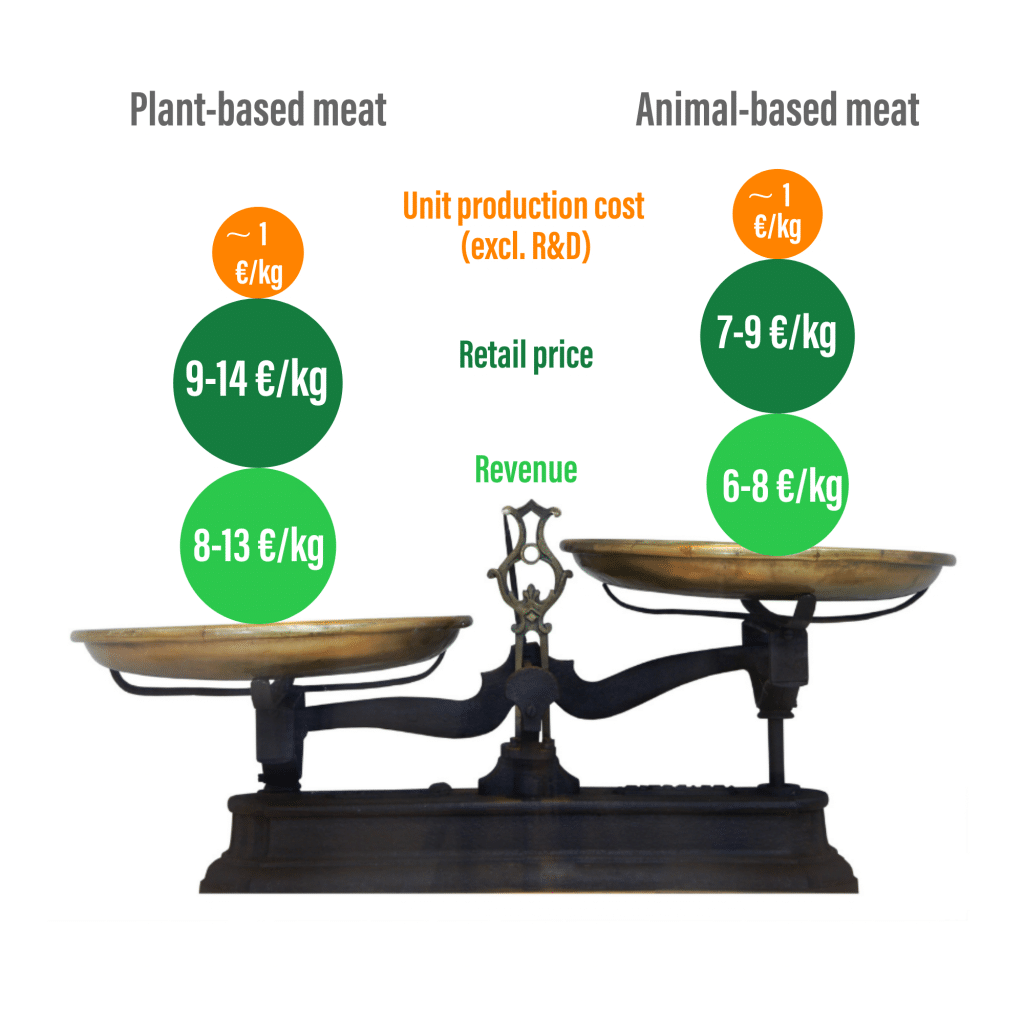
1) Lower your margins
The old wisdom says high prices can offset the low turnover of slow-moving stock. Some retailers believe they need high margins on plant-based products in order to off-set the risk of wastage. But that logic is circular – rotation is low because of over-pricing.
Almost 40% of Western consumers now identify as either vegan, vegetarian, or flexitarian (i.e. omnivores who are reducing their animal-based intake). This means that there’s a huge total addressable market – but disproportionately high retail margins are stifling demand for plant-based products.7
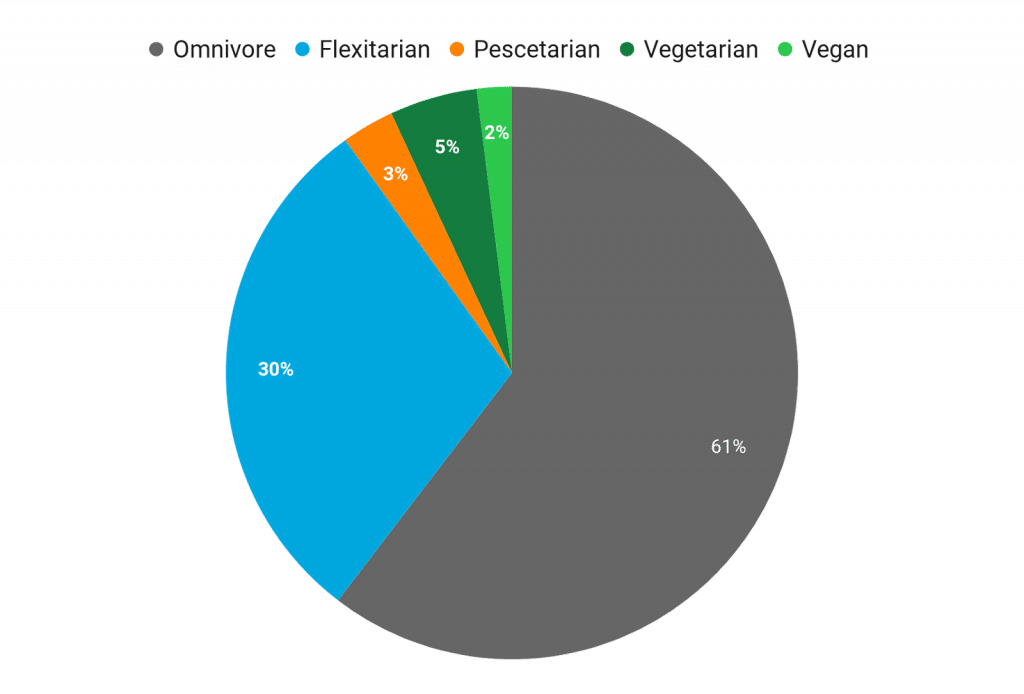
ProVeg spoke to a number of manufacturers who are calling on retailers and brands to lower their margins in order to make plant-based alternatives more accessible to the mainstream. “We push our private label customers not to charge too high on the main market,” explains Frank Giezen, Co-founder of major European manufacturer Ojah. “This indirectly puts pressure on the brands to lower their prices too.”
By reducing retail margins and lowering prices, you can attract more of the flexitarian mass market. This will drive turnover and increase overall revenue. Let’s take a look at some concrete examples:
Lower retail margins on plant-based products can unlock mainstream consumers and increase overall revenue. Example: pricing scenarios for branded burgers.
This table shows the retail prices and margins for branded burgers sold in Europe. The top two rows are based on current market practices, while the bottom row is ProVeg’s recommendation, which market leaders are now adopting.
Many retailers are still charging high margins of 30% on branded plant-burgers (see row two). This delivers a high return per unit but pushes the retail price up to double that of the animal-based equivalent. This price distortion restricts the product’s appeal mostly to vegans. Existing sales data, together with the surveys referenced above, shows that mainstream consumers are not willing to pay the same premium prices as vegan consumers. Thus, the total revenue from branded plant burgers becomes artificially low. Happily, there’s a better way that’s more profitable.
In the bottom row, the same plant-burger is being sold at a lower price. By reducing the retailer margin to 15%, the product’s price becomes accessible to flexitarian consumers. This expands the target market ten-fold.
So how does this compare to animal-based profit? The retailer revenue from 900 typical mixed-eaters would be €189. By contrast, just 400 flexitarian shoppers could generate €299 profit for retailers. By halving your per-unit margin on branded plant-based products you can unlock the flexitarian mass-market and increase overall profits by up to 37%.
Branded products could potentially be made cheaper still through supply deals with the brands themselves. ProVeg is also lobbying governments worldwide to reduce tax rates for plant-based alternatives and support the level playing field that consumers want (more on that later).
In the meantime, you can invest in growing your own-label range – where the reduced manufacturing costs can be directly passed onto customers. Let’s take a look at two major retailers who recently led the way on price parity.
Case Study: Tesco and Co-Op UK
In May 2021, Co-op UK became the first major retailer to introduce price parity with animal products for their entire own-label Gro range of plant-based products. They cut the prices on some products – including vegan sausages and burgers – by as much as 50%.
The price match is part of Co-op’s 10-point climate-change action plan which sets out the blueprint for Co-op to achieve net-zero by 2040 (for both its direct and indirect carbon emissions). The competitively-priced yet high-quality Gro range has been a huge hit with the media and the public.
This move is a step in the right direction and we encourage other retailers and brands to consider making the change too.”
“We’re delighted to see retailers embracing price parity for their plant-based product ranges,” adds Stephanie Jaczniakowska-McGirr, Head of Food Industry & Retail at ProVeg International. “By making products affordable for mainstream consumers, retailers can help generate economies of scale that benefit everyone. You can deliver huge sustainability benefits, and keep customers coming to your stores.”
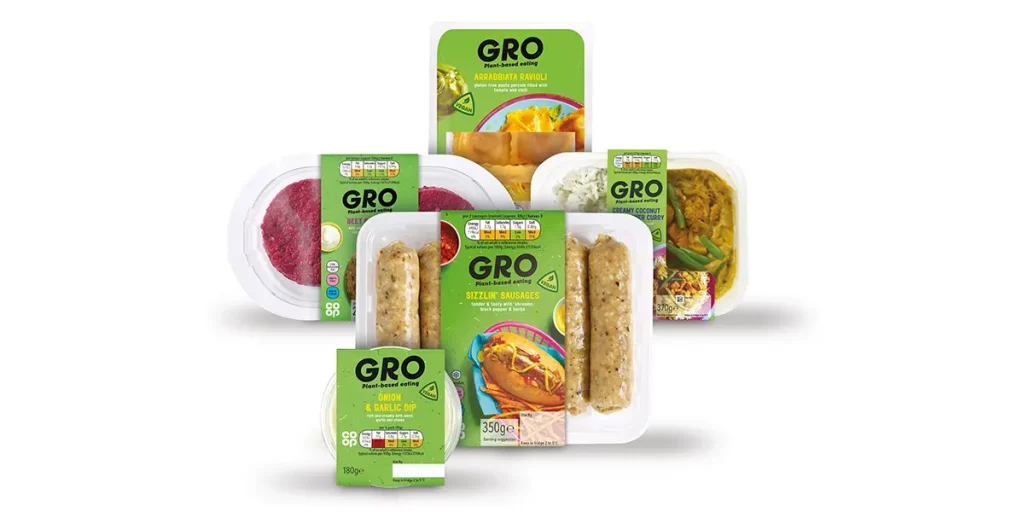
Tesco, the UK’s biggest retailer, followed shortly after Co-op’s move, expanding its plant-based selection and slashing prices across its budget Plant Chef range.
We match prices to the equivalent product to make it easy for people to make the switch.”
This is part of Tesco’s broader environmental strategy, which saw the chain commit to increasing their meat-alternative sales by 300% by 2025.10 One of Tesco’s biggest meat suppliers, Samworth Butchers, has now opened a dedicated plant-based production facility to meet the rising demand from Tesco’s consumers.11

ProVeg Tips
ProVeg has extensive knowledge of flexitarian consumers in Europe. From general preferences to consumer sentiments regarding particular product categories, ProVeg can conduct tailored quantitative and qualitative analyzes in order to generate customized recommendations for your business. We can help you to optimize your margins and pricing strategy in order to increase your overall plant-based revenue and sales. Drop us a line at [email protected].
2) Reduce the cost of ingredients
Retailers and brands can work with their suppliers to lower the costs of key plant-based ingredients. For long-term success, you can’t just rely on driving supplier margins down – you’ll need to work together to innovate and improve the supply chain.
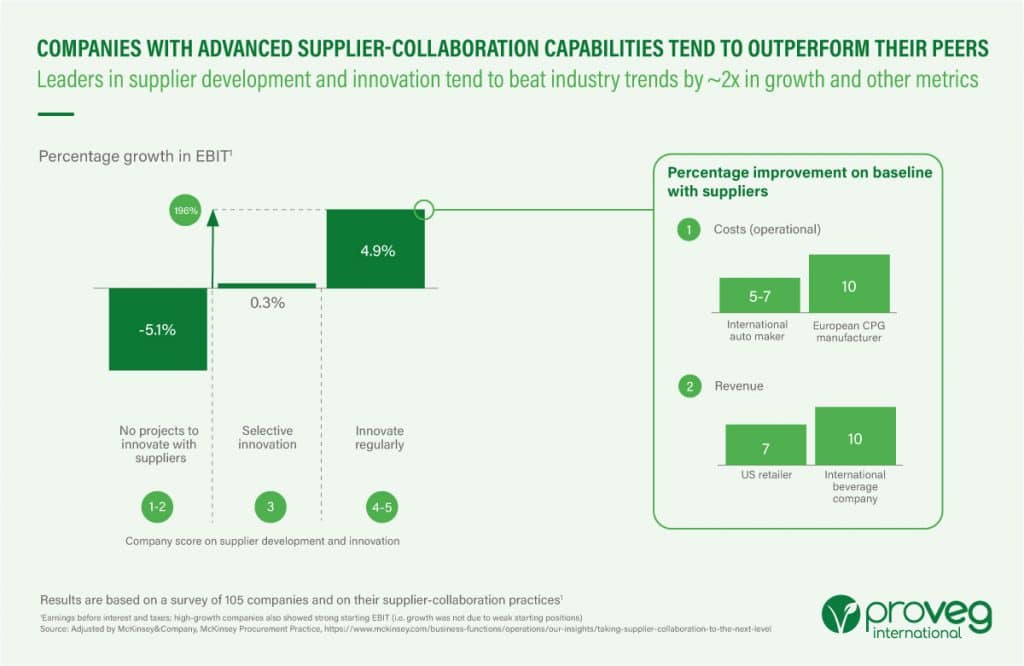
For example, food producer Plant & Bean has a cost-focused R&D roadmap.13 They actively leverage technology to develop more efficient plant-based proteins, with the explicit goal of reducing the costs of peas and beans by 50%.14 Further savings come from their constant innovation of the protein-extraction process and from manufacturing at scale.15 To help achieve these goals, they have a number of long-term partners, including Gushen, a specialized ingredient manufacturer and supplier of premium non-genetically-modified soy protein.
Our innovation ecosystem creates technologies to drive down ingredient and processing costs.”
Impossible Foods recently cut their retail prices by 20%, as well as lowering food-service prices. A key contributing success factor was their partnerships with suppliers. With all parties committed to scaling up production, they were able to improve their economies of scale and pass the resulting savings onto consumers.17
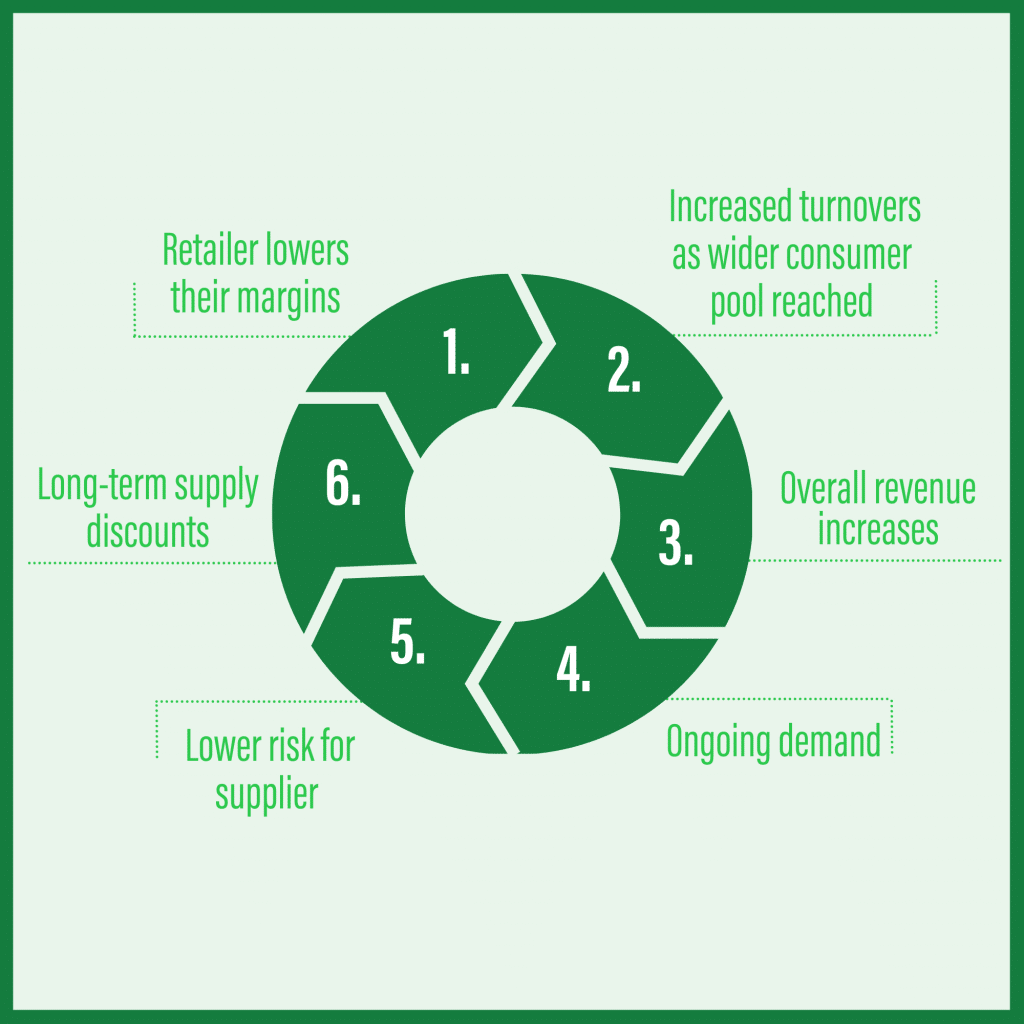

ProVeg Tips
These first two strategies – lowering margins and lowering ingredient costs – work best when the merchandising and marketing strategies are effective. To ensure your products are reaching the flexitarian masses, check out ProVeg’s guide on marketing plant based foods.
Case Study: VBites price stability
VBites produces vegan cheese for Domino’s Pizza in a number of countries. This means that they need to have a robust supply chain that’s insulated against price shocks and is able to consistently meet high demand.
In order to do this, VBites built partnerships with local farmers. For instance, in the UK, they guaranteed multi-year sales to farmers who were willing to switch to growing flaxseed, a crop which is not commonly grown in the UK. Guaranteeing a stable market for farmers gave them the confidence to make the switch. It also helped VBites to negotiate affordable long-term prices for their key ingredients.
The farmer has to make money […] but ultimately they need to keep it at a price point the consumer can afford.”
By working with suppliers to lower risk, retailers can lower ingredient costs and pass on the savings to customers – particularly in their own-label ranges.
Benefit from our extensive network of ingredients and food producers across Europe. We support manufacturers and retailers in replacing animal-based ingredients by offering advice on plant-based alternatives. Our database of functional ingredients from international suppliers will help you to quickly find the optimal solution for your needs. To get started, drop us a line at [email protected].
3) Boost product turnover with long-term discounts
While you’re setting up the three main price parity strategies above, you can start to influence consumer behavior – priming it to be more responsive to your plant-based products. Regular deep-discounts draw consumer attention to plant-based ranges, while providing an extended time frame to explore and adjust to new tastes and textures. After all, 60% of consumers are primarily motivated by price factors and state that an affordable price is important when choosing a food product.19
According to a production expert from ABP Food Group (Anglo Beef Processors), long-term retailer price discounts are key to allowing people to get used to the taste and texture of plant-based products. As such, retailers need to offer producers long-term heavily discounted trial price points for new ranges.22 Discounts are a vital part of your broader consumer engagement strategy, which should also include taste samplings in/outside supermarkets and promotions at the end of aisles. Find out more in our whitepaper: 5 marketing fails to avoid with plant-based foods.
Case Study: Carrefour Belgium’s long-term discounts
Carrefour announced its Act For Food strategy in 2018, with the aim of transitioning the global food system towards healthy and sustainable products that boost local economies while combating climate change.20
Carrefour is purposefully “harnessing the growing popularity of diets that exclude or reduce the consumption of meat”. They’re expanding their own-label ‘Carrefour Veggie’ range, and already sell over 70 V-Label-certified products.21
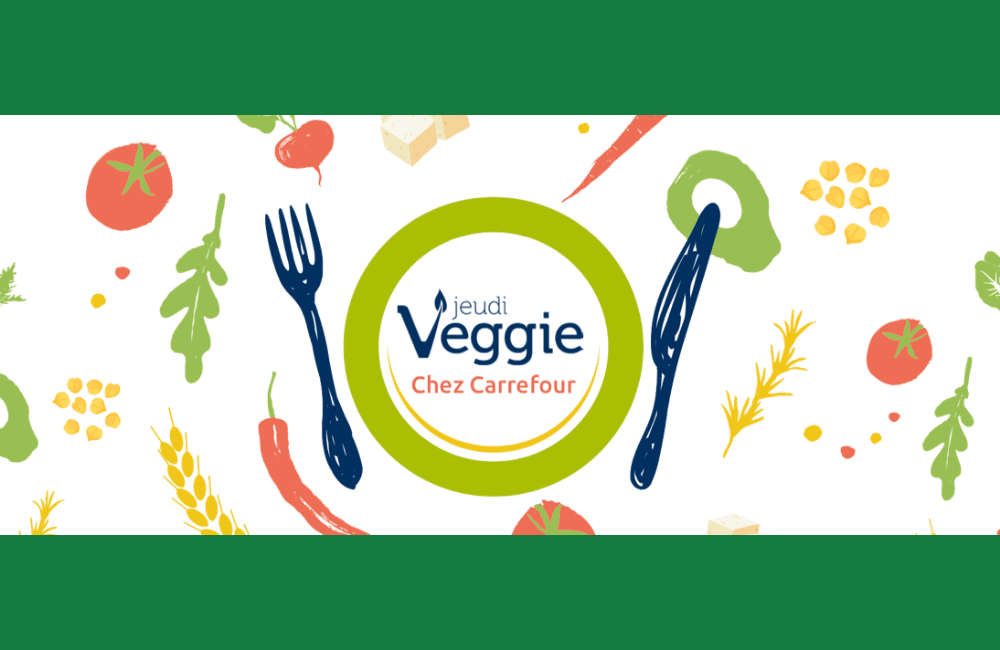
To make veggie products more accessible to consumers, Carrefour partnered with the Belgian NGO, EVA, in their nationwide Veggie Thursday campaign.23 Since 2019, Carrefour customers across Belgium have been able to enjoy a 10-20% discount on Carrefour’s own-label chilled veggie products every Thursday.
For the last few years, ProVeg has been hosting the month-long Veggie Challenge campaign across Europe and around the world – with almost half a million enthusiastic participants, to date. We’re now partnering with retailers to help more people take the Veggie Challenge by offering month-long discounts across plant-based ranges. If you’d like to become a campaign partner and advance your organisation’s sustainability goals, please get in touch with us at [email protected].
Bonus Tip: Lobby for tax and subsidy reform
Reason 1: we need a level playing field
In developed nations, intensive animal agriculture is only viable because of substantial annual government subsidies. These subsidies mean that the retail prices that western consumers pay for animal meat and dairy are artificially cheap.
As the UN Environment Program notes, “87% – out of $540 billion – of annual government support to agricultural producers includes both measures that are price distorting and those that can be harmful to nature and health.”24
Plant-based alternatives to animal meat and dairy generally receive zero subsidies – making them disproportionately expensive for consumers in comparison to their animal-based counterparts. As detailed above, this lack of price disparity is a major barrier to consumer adoption. Our current food policies are pricing the general public out of nutritious plant-rich diets while supporting some of the most environmentally damaging and outdated agricultural practices.
Case Study: food sales taxes in Germany
VAT is regulated by national law in most countries. In Germany, foods which have been historically designated as ‘essential’ are taxed at the lowest rate of 7%. Dairy milk currently falls into this category. However, new plant-based alternatives, which offer nutritional and environmental benefits, are currently taxed at the highest rate of VAT – 19%. The precise difference varies across Europe, but the pattern is the same: plant-based alternatives are generally taxed at higher rates than their animal-based counterparts.
At a minimum, ProVeg is calling for a level playing field when it comes to taxes, subsidies, and regulatory hurdles for innovative plant-based foods. Ultimately, we believe that these legacy tax incentives should be fully inverted – ensuring that consumers are financially supported to make the decisions that are best for both their health and our planet.
“The ultimate goal would be regulations that favor plant-based over animal-based food, e.g. 19% VAT on all animal-based foods in Germany, and 7% on all plant-based alternatives,” explains Dirk Liebenberg, Corporate Engagement Project Manager at ProVegGermany. “In the meantime, we are calling on our industry partners to support our campaign efforts to achieve a level playing field. The benefit to retailers is clear – lower prices mean more plant-based sales.”
Industry has a vital role to play in bringing about reform. ProVeg and its partners are calling for a level playing field and just transition for farmers. By lending your support to our campaign, you can massively accelerate this vital change – just as Oatly, Fry’s, Upfield, Vivera, and dozens of other national and international organizations are doing. Find out more and take our pledge to support Diet Change Not Climate Change.
Stay tuned for an inspirational case study on how industries worked together to achieve positive change across Europe.
Reason 2: policy has fallen behind science
Governments and scientists worldwide now acknowledge that it’s perfectly possible to enjoy a balanced, healthy lifestyle on a plant-based diet. As nutrition professor Winston J Craig and his colleagues summarize, “Vegetarian and vegan diets provide protection against a number of common chronic diseases […and] are appropriate for all stages of the life cycle.”25
In fact, scientists don’t just say that a plant-rich diet is possible – they say it’s actively beneficial for both our health and the planet. For instance, WHO Europe recommends a diet based mainly on plants, rather than animals,26while England’s National Health Service says that a healthy and balanced vegan diet can provide all necessary nutrients.27 Australia’s national dietary guidelines similarly assert the nutritional adequacy of vegan diets for all stages of life.28 The American Dietetic Association agrees, stating that vegetarian and vegan diets can be appropriate for everyone, from infants, to athletes, to the elderly.29 The Indian Council of Medical Research describes a healthy, balanced diet comprised of 50% vegetables and fruits, 25% cereals, and 25% protein-rich foods such as pulses, nuts, and vegetable oils.30
In fact, the Indian government is one of the first major governments to actively promote a plant-based lifestyle. Their health ministry’s Eat Right India campaign aims to protect both people and planet through increased consumption of plant-based foods.
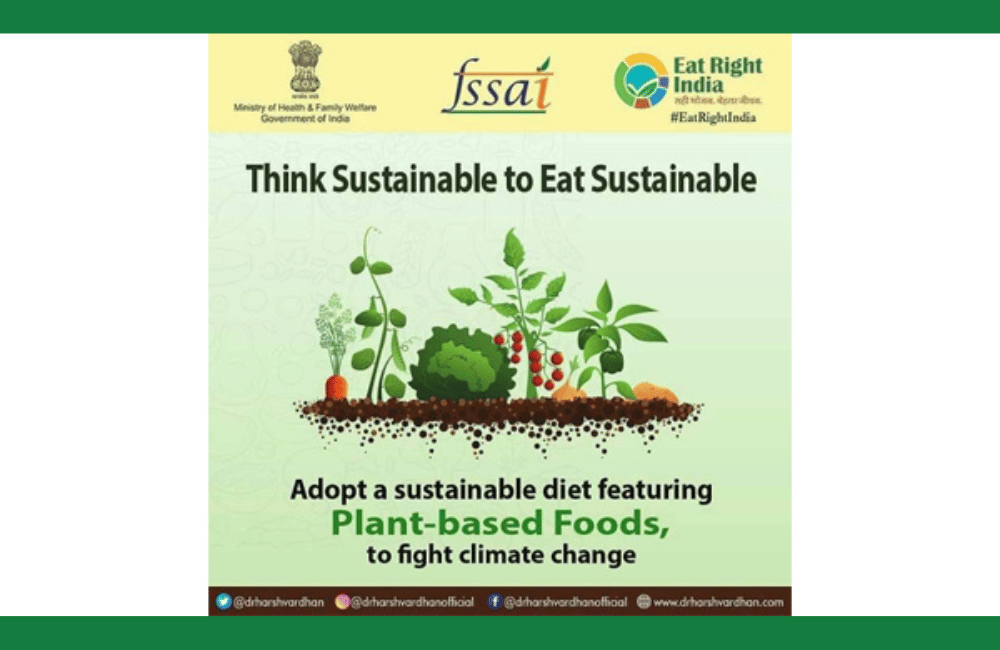
Developed countries urgently need to reform their national tax and subsidy systems. By creating a level playing field for plant-based products across the Global North, where animal-product consumption is greatest, we can encourage healthier and more sustainable outcomes for consumers, companies, and our planet.
We need to level the playing field
1l of branded fresh dairy milk
German example:
typical retail price: €1.39
of which sales tax: 7%
of which retailer margin: 7%
xxternal costs*: -€2.7833
*Government subsidies, healthcare, and climate costs
1l of branded oat milk
German example:
typical retail price: €2.19
of which sales tax: 19%
of which retailer margin: 30%
external costs*: as low as $0
Negligible or zero government subsidies, despite overall health and climate benefits
In many countries, there is a worrying disconnect between the retail price of food and the true cost of its production. As a consequence, food produced at great environmental cost […] can appear to be cheaper than more sustainably produced alternatives.”
Case Study: Industry unites to end period poverty
For decades, essential female menstrual products incurred the highest rate of sales tax across many Western countries. This placed unnecessary financial stress on women, with the cost of sanitary products being a potent symbol of gender inequality. The issue also disproportionately affected the poor, with girls from disadvantaged economic backgrounds missing school for days every month simply because they couldn’t afford sanitary products.
Campaigns to end period poverty were launched across the world. They have been a great success story – and an example of the positive change that an industry can achieve when it joins with NGOs and others to unite behind a shared vision for a better world.

In 2017, the UK announced plans to reduce VAT on sanitary products from 20% to 5% (the legal minimum allowed under EU law at the time). This campaign was critically dependent on industry support. Thankfully, retailers across the UK united in pledging to honor the price reduction.36
“With retailers coming on board, the UK government and European leaders should set a clear timetable for the tampon tax to be abolished,” said labor MP Paula Sherriff, who was the leader of the successful campaign at the time.37
Tesco, the UK’s biggest retailer, took the lead and reduced the cost of their sanitary products a year before the tax reduction came into effect, absorbing the cost themselves while continuing to support the campaign.38
In Germany, lobbying from an industry coalition successfully reduced sales tax on tampons from 19% to 7% in 2020,39 and all EU member states are expected to abolish tampon sales taxes entirely from 2022. The UK further lowered its rate from 5% to 0% in 2021,40 catching up with the likes of Ireland and 14 other nations which had already eliminated the tax.41
ProVeg acknowledges that period poverty remains an issue in many countries around the world, and we stand by all those pushing for a fairer planet. We take great courage from the progress that has been made, and we urge our partners in the food industry to answer the call for a better world. Your voice can help us achieve a level playing field for plant-based foods. Get in touch with us at [email protected] and join our campaign to urgently reform the global food system.
Conclusion
Brands and retailers must achieve price parity on plant-based alternatives. This is key to unlocking flexitarian and reducetarian mass markets, meeting your organisation’s sustainability goals, and future-proofing your business against continuing plant-based food trends.
Retailers should bring plant-based margins into line with those of animal-based products, invest in continual innovation of new products and production facilities, partner with farms to ensure a long-term supply of plant proteins, and lobby for subsidy and tax reform by supporting ProVeg’s calls for a level playing field between animal-based and plant-based products.
As a leading NGO in the alternative-protein space, we have no commercial agenda. We provide objective expert advice to help you harness the power and profitability of the shift to plant-based eating. ProVeg can assist with a wide range of interventions across the entire value chain, including the best price-parity strategy for your organization. Just email [email protected] to get started.
Note: ProVeg conducts exclusive interviews with a wide range of industry professionals for its New Food Hub white papers. Unless an alternative citation is provided, quotations are from those interviews. Some interviewees wished to remain anonymous.
References
- Interviewed by ProVeg International, December 2021.
- Insights from ProVeg International interviews with four major European manufacturers and retailers, September to November 2021.
- Smart Protein project (2021): What consumers want: A survey on European consumer attitudes towards plant-based foods. Country specific insights. European Union’s Horizon 2020 research and innovation program (No 862957). Available at https://smartproteinproject.eu/consumer-attitudes-plant-based-food-report/ (last accessed 16.12.2021).
- Smart Protein project (2021): What consumers want: A survey on European consumer attitudes towards plant-based foods. Country specific insights. European Union’s Horizon 2020 research and innovation program (No 862957). Available at https://smartproteinproject.eu/consumer-attitudes-plant-based-food-report/ (last accessed 16.12.2021).
- Schneider, P (2020): Fleischindustrie kapert Veggie-Branche: “Sie verdienen Millionen mit der Chemie-Pampe”. Focus online. Available at https://www.focus.de/perspektiven/gesellschaft-gestalten/tofu-vom-schlachthof-wie-die-fleischindustrie-vom-veggie-boom-profitiert_id_12257774.html (last accessed 24.01.2022).
- Schneider, P (2020): Fleischindustrie kapert Veggie-Branche: “Sie verdienen Millionen mit der Chemie-Pampe”. Focus online. Available at https://www.focus.de/perspektiven/gesellschaft-gestalten/tofu-vom-schlachthof-wie-die-fleischindustrie-vom-veggie-boom-profitiert_id_12257774.html (last accessed 24.01.2022).
- Smart Protein project (2021): What consumers want: A survey on European consumer attitudes towards plant-based foods. Country specific insights. European Union’s Horizon 2020 research and innovation program (No 862957). Available at https://smartproteinproject.eu/consumer-attitudes-plant-based-food-report/ (last accessed 16.12.2021).
- Smart Protein (2021): What consumers want: A survey on European consumer attitudes towards plant-based foods. Country specific insights. European Union’s Horizon 2020 research and innovation program (No 862957) https://proveg.com/what-we-do/corporate-engagement/consumer-attitudes-plant-based-food-report/ Accessed 2021-12-02.
- Whitfield, J (2021): We’ve cut the price of our plant-based Co-op GRO range to make it more affordable for everyone! Co-op. Available at https://www.coop.co.uk/blog/weve-cut-the-price-of-our-plant-based-co-op-gro-range-to-make-it-more-affordable-for-everyone (last accessed 24.01.2022).
- Tesco (2020): Tesco commits to 300% sales increase in meat alternatives. Available at https://www.tescoplc.com/news/2020/tesco-commits-to-300-sales-increase-in-meat-alternatives/ (last accessed 24.01.2022).
- Vegconomist (2021): Meat product manufacturer opens dedicated plant-based facility to supply tesco with vegan products. Available at https://vegconomist.com/companies-and-portraits/meat-products-manufacturer-opens-dedicated-plant-based-facility-to-supply-tesco-with-vegan-products/ (last accessed 24.01.2022).
- https://www.mckinsey.com/business-functions/operations/our-insights/taking-supplier-collaboration-to-the-next-level
- Plant and Bean (n.y.): Seed2Fork approach. Available at https://plantandbean.com/ (last accessed 24.01.2022).
- Addy, R (2020): Europe’s largest plant-based factory to open in UK. Food Manufacture. Available at https://www.foodmanufacture.co.uk/Article/2020/12/09/Plant-Bean-to-open-Europe-s-largest-plant-based-factory-in-UK# (last accessed 06.12.2021).
- Askew, K (2020): Plant & Bean opens Europe’s ‘largest’ plant-based meat factory: ‘To make an impact you have to drive scale’. Foodnavigator. Available at https://www.foodnavigator.com/Article/2020/12/09/Plant-Bean-opens-Europe-s-largest-plant-based-meat-factory (last accessed 06.12.2021).
- Plant and Bean (n.y.): Seed2Fork approach. Available at https://plantandbean.com/ (last accessed 24.01.2022).
- Lucas, A (2021): Impossible Foods lowers grocery store prices amid pandemic-fueled retail expansion. CNBC. Available at https://www.cnbc.com/2021/02/02/impossible-foods-lowers-grocery-store-prices-by-20percent.html (last accessed 06.12.2021).
- Speaking at Plant Based Expo in London, October 2021.
- Smart Protein (2021): What consumers want: A survey on European consumer attitudes towards plant-based foods. Country specific insights. European Union’s Horizon 2020 research and innovation program (No 862957). Available at https://proveg.com/what-we-do/corporate-engagement/consumer-attitudes-plant-based-food-report/ (last accessed 02.12.2021).
- Carrefour (n.y.): What is Carrefour doing to make the food transition possible? Available at https://www.carrefour.com/en/group/food-transition (last accessed 24.01.2022).
- Carrefour (2020): 2020 Annual Financial Report. Available at https://www.carrefour.com/sites/default/files/2021-05/Carrefour-URD2020-EN_02.pdf (last accessed 24.01.2022).
- https://www.altavia-shoppermind.com/long-live-veggie-thursday/
- EVA. Available at https://www.evavzw.be/fr (last accessed 24.01.2022).
- UN environment program (2021): UN report calls for repurposing of USD 470 billion of agricultural support that distorts prices, environment and social goals https://www.unep.org/news-and-stories/press-release/un-report-calls-repurposing-usd-470-billion-agricultural-support Accessed 2021-12-02.
- Craig, W J et. al. (2021): The safe and effective use of plant-based diets with guidelines for health professionals. Available at https://pubmed.ncbi.nlm.nih.gov/34836399/ (last accessed 02.12.2021).
- WHO Europe (n.y.): A healthy lifestyle. Available at https://www.euro.who.int/en/health-topics/disease-prevention/nutrition/a-healthy-lifestyle (last accessed 24.01.2022).
- NHS (2018): The vegan diet. Available at https://www.nhs.uk/live-well/eat-well/the-vegan-diet/ (last accessed 02.12.2021).
- National Health and Medical Research Council (2013): Australian Dietary Guidelines. Canberra: National Health and Medical Research Council. Available at https://www.eatforhealth.gov.au/sites/default/files/content/n55_australian_dietary_guidelines.pdf (last accessed 02.12.2021).
- ADA (2009): Position of the American Dietetic Association: Vegetarian diets. Available at https://www.jandonline.org/article/S0002-8223(09)00700-7/fulltext (last accessed 02.12.2021).
- ICMR and National Institute of Nutrition Tarnaka (2021): Nutrition, lifestyle & immunity. Available at https://nin.res.in/downloads/Nutrition_Lifestyle_and_Immunity.pdf (last accessed 02.12.2021).
- Image source: https://www.veganfirst.com/article/indian-government-says-eat-plant-based-foods-to-fight-climate-change
- https://www.supermarkt24h.de/weihenstephan-alpenmilch-3-5-1l/a-1349515655/?curr=EUR&googlede=1&gclid=Cj0KCQiAjJOQBhCkARIsAEKMtO0Zwd7ktVN0R47dttno27670sVZMftLT7egL6M8qm4jZTXQutuWbX8aAn45EALw_wcB
- https://www.dm.de/oatly-pflanzendrink-haferdrink-barista-edition-p7394376616501.html?wt_mc=pla.google.Ernaehrung.MilchMilchalternativen.Pflanzendrinks.Oatly.7394376616501&hc_tid=10215516C4751PPC&gclid=Cj0KCQiAjJOQBhCkARIsAEKMtO1PPL6A5BovUTlcWQXpTTL3iGi9Ilo1FQxJqEL-bRevddRdw79saIEaAuNsEALw_wcB
- Compassion in world farming (n.y.): Paying for the true costs of our meat, eggs and dairy. Available at https://www.ciwf.org.uk/media/7431690/paying-for-the-true-costs-of-our-meat-eggs-and-dairy.pdf (last accessed 24.01.2022).
- https://www.bbc.co.uk/news/business-55502252
- Hughes, P (2017): Tesco removes the Tampon Tax from women’s sanitary products. Inews. Available at https://inews.co.uk/news/uk/tesco-removes-tampon-tax-womens-sanitary-products-81444 (last accessed 24.01.2022).
- Hughes, P (2017): Tesco removes the Tampon Tax from women’s sanitary products. Inews. Available at https://inews.co.uk/news/uk/tesco-removes-tampon-tax-womens-sanitary-products-81444 (last accessed 24.01.2022).
- Hughes, P (2017): Tesco removes the Tampon Tax from women’s sanitary products. Inews. Available at https://inews.co.uk/news/uk/tesco-removes-tampon-tax-womens-sanitary-products-81444 (last accessed 24.01.2022).
- Marina (2019): Stand up for your rights – Liveticker zur Tamponsteuer (WE MADE IT!). The Female Company. Available at https://www.thefemalecompany.com/magazin/liveticker-tamponsteuer/ (last accessed 24.01.2022).
- Russon, M-A (2021): Activists cheer as ‘sexist’ tampon tax is scrapped. BBC. Available at https://www.bbc.com/news/business-55502252 (last accessed 24.01.2022).
- Rodgiguez, L (2021): The Tampon Tax: Everything you need to know. Global Citizen. Available at https://www.globalcitizen.org/en/content/tampon-tax-explained-definition-facts-statistics/ (last accessed 24.01.2022).

